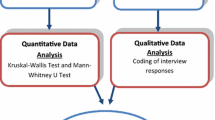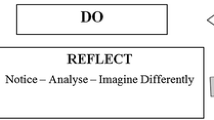Abstract
In this study, we examined prospective middle school mathematics teachers’ reflective thinking skills to understand how they learned from their own teaching practice when engaging in a modified lesson study experience. Our goal was to identify variations among prospective teachers’ descriptions of students’ thinking and frequency of their interpretations about how teaching affected their students’ learning. Thirty-three participants responded to open-ended questionnaires or interviews that elicited reflections on their own teaching practice. Prospective teachers used two forms of nuance when describing their students’ thinking: (1) identifying students’ specific mathematical understandings rather than general claims and (2) differentiating between individual students’ thinking rather than characterizing students as a collective group. Participants who described their students’ thinking with nuance were more likely to interpret their teaching by posing multiple hypotheses with regard to how their instruction affected their students’ learning. Implications for supporting continued growth in reflective thinking skills are discussed in relation to these results.
Similar content being viewed by others
References
Artzt, A. F. (1999). A structure to enable preservice teachers of mathematics to reflect on their teaching. Journal of Mathematics Teacher Education, 2(2), 143–166.
Ball, D. L., & Lampert, M. (1999). Multiples of evidence, time and perspective. In E. C. Lagemann & L. S. Shulman (Eds.), Issues in education research: Problems and policies (pp. 371–398). San Francisco: Jossey-Bass.
Clark, C. M. (1988). Asking the right questions about teacher preparation: Contributions of research on teacher thinking. Educational Researcher, 17(2), 5–12.
Conway, P. F., & Clark, C. M. (2003). The journey inward and outward: A re-examination of Fuller’s concerns-based model of teacher development. Teaching and Teacher Education, 19(5), 465–482.
Crespo, S. (2000). Seeing more than right and wrong answers: Prospective teachers’ interpretations of students’ mathematical work. Journal of Mathematics Teacher Education, 3(2), 155–181.
Creswell, J. (2007). Qualitative inquiry & research design. Choosing among five traditions (2nd ed.). Thousand Oaks: Sage Publications.
Davis, E. A. (2006). Characterizing productive reflection among pre-service teachers: Seeing what matters. Teaching and Teacher Education, 22(3), 281–301.
Feiman-Nemser, S., & Buchmann, M. (1986). The first year of teacher preparation: Transition to pedagogical thinking? Journal of Curriculum Studies, 18(3), 239–256.
Fernandez, C. (2002). Learning from Japanese approaches to professional development: The case of lesson study. Journal of Teacher Education, 53(5), 393–405.
Fernandez, C. (2005a). Lesson study: A means for elementary teachers to develop the knowledge of mathematics needed for reform-minded teaching? Mathematical Thinking and Learning, 7(4), 265–289.
Fernandez, M. L. (2005b). Learning through microteaching lesson study in teacher preparation. Action in Teacher Education, 26(4), 37–47.
Fernandez, C., Cannon, J., & Chokski, S. (2003). A US–Japan lesson study collaboration reveals critical lenses for examining practice. Teaching and Teacher Education, 19, 171–185.
Fuller, F. F. (1969). Concerns of teachers: A developmental conceptualization. American Educational Research Journal, 6(2), 207–226.
Glaser, B. G., & Strauss, A. L. (1967). The discovery of grounded theory: Strategies for qualitative research. New York: Aldine.
Grimmett, P. P., & MacKinnon, A. M. (1992). Craft knowledge and the education of teachers. Review of Research in Education, 18, 385–456.
Haritos, C. (2004). Understanding teaching through the minds of teacher candidates: A curious blend of realism and idealism. Teaching and Teacher Education, 20(6), 637–654.
Hiebert, J., Morris, A. K., & Glass, B. (2003). Learning to learn to teach: An “experiment” model for teaching and teacher preparation in mathematics. Journal of Mathematics Teacher Education, 66(3), 201–222.
Hiebert, J., Morris, A. K., Berk, D., & Jansen, A. (2007). Preparing teachers to learn from teaching. Journal of Teacher Education, 58(1), 47–61.
Jacobs, J. K., & Morita, E. (2002). Japanese and American teachers’ evaluations of videotaped mathematics lessons. Journal for Research in Mathematics Education, 33(3), 154–175.
Jacobs, J. K., Yoshida, M., Stigler, J. W., & Fernandez, C. (1997). Japanese and American teachers’ evaluations of mathematics lessons: A new technique for exploring beliefs. Journal of Mathematical Behavior, 16(1), 7–24.
Jansen, A. (2007). Factors that influence novice middle school mathematics teachers’ analyses of their instruction and opportunities to learn from their own teaching. In T. Lamberg, & L. R. Wiest (Eds.), Proceedings of the twenty-ninth annual meeting of the North American chapter of the international group for the psychology of mathematics education (pp. 98–101). Stateline (Lake Tahoe), NV: University of Nevada, Reno.
Jaworski, B. (2006). Theory and practice in mathematics teaching development: Critical inquiry as a mode of learning in teaching. Journal of Mathematics Teacher Education, 9(2), 187–211.
Krainer, K. (2006). Editorial: Action research and mathematics teacher education. Journal for Research in Mathematics Teacher Education, 9(3), 213–219.
Lewis, C. (2002). Lesson study: A handbook for teacher-led improvement of instruction. Philadelphia, Pennsylvania, USA: Research for Better Schools.
McDuffie, A. R. (2004). Mathematics teaching as a deliberate practice: An investigation of elementary pre-service teachers’ reflective thinking during student teaching. Journal of Mathematics Teacher Education, 7(1), 33–61.
Mewborn, D. S. (2000). Learning to teach elementary mathematics: Ecological elements of a field experience. Journal of Mathematics Teacher Education, 3(1), 27–46.
Otero, V. K. (2006). Moving beyond the “get it or don’t” conception of formative assessment. Journal of Teacher Education, 57(3), 247–255.
Rodgers, C. R. (2002). Seeing student learning: Teacher change and the role of reflection. Harvard Educational Review, 72(2), 230–253.
Santaga, R., Zannoni, C., & Stigler, J. (2007). The role of lesson analysis in pre-service teacher education: An empirical investigation of teacher learning from a virtual video-based field experience. Journal of Mathematics Teacher Education, 10(2), 123–140.
Schön, D. (1987). Educating the reflective practitioner: Toward a new design for teaching and learning in the professions. San Francisco: Jossey-Bass.
Sherin, M. G., & Han, S. Y. (2004). Teacher learning in the context of a video club. Teaching and Teacher Education, 20(2), 163–183.
Smith, J. P., I. I. I. (1996). Efficacy and teaching mathematics by telling: A challenge for reform. Journal for Research in Mathematics Education, 27(4), 387–402.
Star, J. R., & Strickland, S. K. (2008). Learning to observe: Using video to improve preservice mathematics teachers’ ability to notice. Journal of Mathematics Teacher Education, 11(2), 107–125.
Stockero, S. L. (2008). Using a video-based curriculum to develop a reflective stance in prospective mathematics teachers. Journal of Mathematics Teacher Education, 11(5), 373–394.
van Es, E. A., & Sherin, M. G. (2002). Learning to notice: Scaffolding new teachers’ interpretations of classroom interactions. Journal of Technology and Teacher Education, 10(4), 571–596.
van Es, E. A., & Sherin, M. G. (2008). Mathematics teachers’ “learning to notice” in the context of a video club. Teaching and Teacher Education, 24(2), 244–276.
Acknowledgments
Preparation of this article was supported by the National Science Foundation, Grant 0083429 to the Mid-Atlantic Center for Teaching and Learning Mathematics. The opinions expressed in the article are those of the authors and not necessarily those of the Foundation. Previous versions of this study were presented at the 2007 annual meeting of the American Educational Research Association in Chicago, Illinois, USA, and the 2008 research pre-session of the annual meeting of the National Council of Teachers of Mathematics in Salt Lake City, Utah, USA. The authors would like to thank those who assisted with this study: Betsy Read taught the additional section of the middle school mathematics curriculum and methods course. Nicola Edwards-Omolewa, Delayne Johnson, and Christine Phelps assisted with data collection. James Beyers and Rachel Francis served as consultants during early phases of data analysis. We also appreciate feedback from Jim Hiebert on an earlier draft of this manuscript.
Author information
Authors and Affiliations
Corresponding author
Appendix
Appendix
Questionnaire/interview items
-
1.
Consider your first lesson that you taught in your field placement about division of fractions. Did the lesson go well or not? Explain.
-
2.
What did you hope students would learn from this lesson?
-
3.
More specifically, do you think the students learned what you hoped they would learn? How do you know? Why do you think they did or did not learn this?
-
4.
If you could have changed anything about your experiences teaching this lesson in order to improve students’ learning, what would you have changed? Which of these changes would be most beneficial to promote students’ learning? Why?
-
5.
How would you evaluate your teaching during this lesson?
-
(a)
Very effective
-
(b)
Somewhat effective
-
(c)
Neither effective or ineffective
-
(d)
Somewhat ineffective
-
(e)
Very ineffective
Explain your reasons for this choice.
-
(a)
-
6.
For this question, think about the design of the lesson itself rather than your teaching: Overall, to what degree would you say this lesson was an effective lesson?
-
(a)
Very effective
-
(b)
Somewhat effective
-
(c)
Neither effective or ineffective
-
(d)
Somewhat ineffective
-
(e)
Very ineffective
Explain your reasons for this choice.
-
(a)
Rights and permissions
About this article
Cite this article
Jansen, A., Spitzer, S.M. Prospective middle school mathematics teachers’ reflective thinking skills: descriptions of their students’ thinking and interpretations of their teaching. J Math Teacher Educ 12, 133–151 (2009). https://doi.org/10.1007/s10857-009-9099-y
Received:
Accepted:
Published:
Issue Date:
DOI: https://doi.org/10.1007/s10857-009-9099-y




